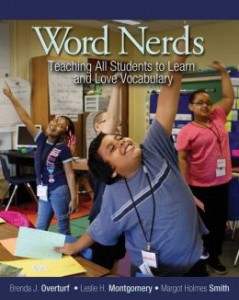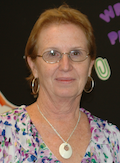Reinvent Vocabulary Instruction
Word Nerds: Teaching All Students to Learn and Love Vocabulary
By Brenda J. Overturf, Leslie H. Montgomery & Margot Holmes Smith
(Stenhouse Publishers, 2013 – Learn more)
The facts are quite startling. Research has shown that a child’s vocabulary knowledge is frequently tied to economic background. According to Hart and Risley (1995) there is a ’30-million word gap’ (words children hear and learn) between preschoolers from professional families and those from economically disadvantaged households. (Word Nerds, p.8)
The good news is that the recently adopted Common Core Standards focus on word knowledge. In fact, there is an entire cluster on Vocabulary Acquisition and Use (Language). In addition, the standards for Writing include references to the use of appropriate vocabulary in writing pieces, especially in informative or explanatory texts.

Integrating vocabulary instruction into the literacy curriculum
As I read the book, I put myself in the place of my students. Imagine your principal requiring you to memorize all the housing codes in your district and asking you to match each code number with the correct description. You might remember a few that are relevant, but the chances are you won’t remember most of them because they are not part of your everyday conversation.
That’s exactly what our students go through when we hand them vocabulary lists and ask them to define words that they may never use again, especially students who live in impoverished communities. They do not have the schema to link the words with the concepts. Throwing a useless vocabulary list into their already chaotic world invites failure and lack of confidence.
I immediately began to wonder where I would find the time to teach meaningful vocabulary lessons along with Guided Reading, Shared Reading, Shared Writing, Close Reading, Word Study, assemblies, and fire drills. Here’s the answer: the authors provide the reader with guidance on how to integrate vocabulary development as a natural component of the literacy curriculum, not an isolated, extra-time activity.
This book is not a one-size-fits-all scripted program, but a systematic approach towards making the best decisions about how to choose vocabulary words that meet the needs of your students through a differentiated learning approach. No longer is the teaching of vocabulary a purely pencil & paper activity, but a fun process that uses chants, movements, claps, songs, role playing and creativity.
Serious vocabulary fun
What I love about Word Nerds is its advocacy for the active engagement of students in their study of vocabulary and the importance of celebrating successes. They encourage hosting “vocabulary celebrations” such as Jeopardy! Party, Deal or No Deal Party, Charades, Dance Party, American Idol Party (students sing songs they created using their vocabulary words) and Art Show (a Gallery Walk of student artwork depicting vocabulary words). While the students are practicing their new-found knowledge, the teacher is able to informally assess the students’ grasp of the concepts. What a great deal!
However, the authors stress that while you can make the study of vocabulary fun, this book is not just a set of fun activities to use during the day. Active formative assessment is embedded in each activity to help the teacher understand what the student knows and can do. Other equally helpful book ingredients: a sample schematic vocabulary cycle plan of learning experiences, assessment strategies, and suggested next instructional steps.
The authors recommend these four general assessment guidelines, based on the research of Bean and Swan Dagen (2006).
- Think about the goals and purposes of the assessment
- Use authentic measures of vocabulary progress
- Plan for ways to assess depth of understanding
- Be aware of comprehension connections to vocabulary learning
A book worthy of group study in your school
I would encourage teachers to establish a “Word Nerd Book Club” with colleagues in their school. Stenhouse Publishers offers an online study guide with a chapter-by-chapter review for a professional book study.
Each section of the Word Nerds study guide includes:
- Synopsis
- Guiding Questions for Discussion
- Quote to Ponder – A quote from the book to help you understand the authors’ thinking
- Ideas for Work Groups – Activities that teams can do as part of a Professional Learning Community
Catchy as the title is, I wish the authors had chosen Word Geniuses. My second wish: That this book had been available when I first started teaching!
Word Nerds raises the level of vocabulary instruction by setting the bar high for teachers, challenging us to provide students with the desire to study vocabulary and apply their knowledge not only to standardized tests but to daily writing and conversation.
Linda Biondi is a fifth grade teacher at Pond Road Middle School in Robbinsville, New Jersey. She is also a Teacher Consultant with the National Writing Project and co-facilitates a symposium each summer to improve teacher practices, specifically in literacy. This year she participated on the New Jersey Department of Education Teacher Advisory Panel, to provide feedback on current state initiatives and new opportunities to support teachers in increasing student achievement.



































